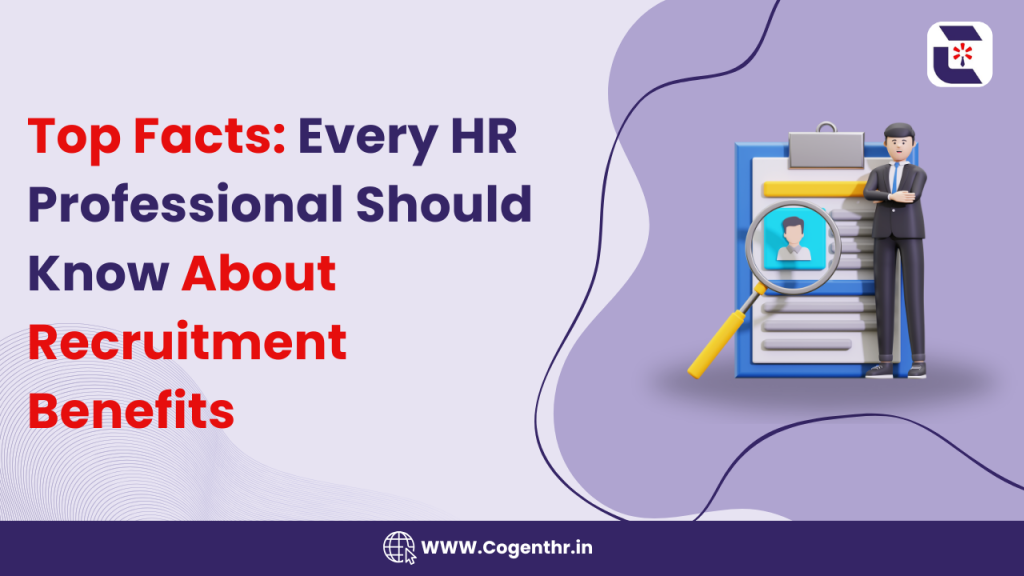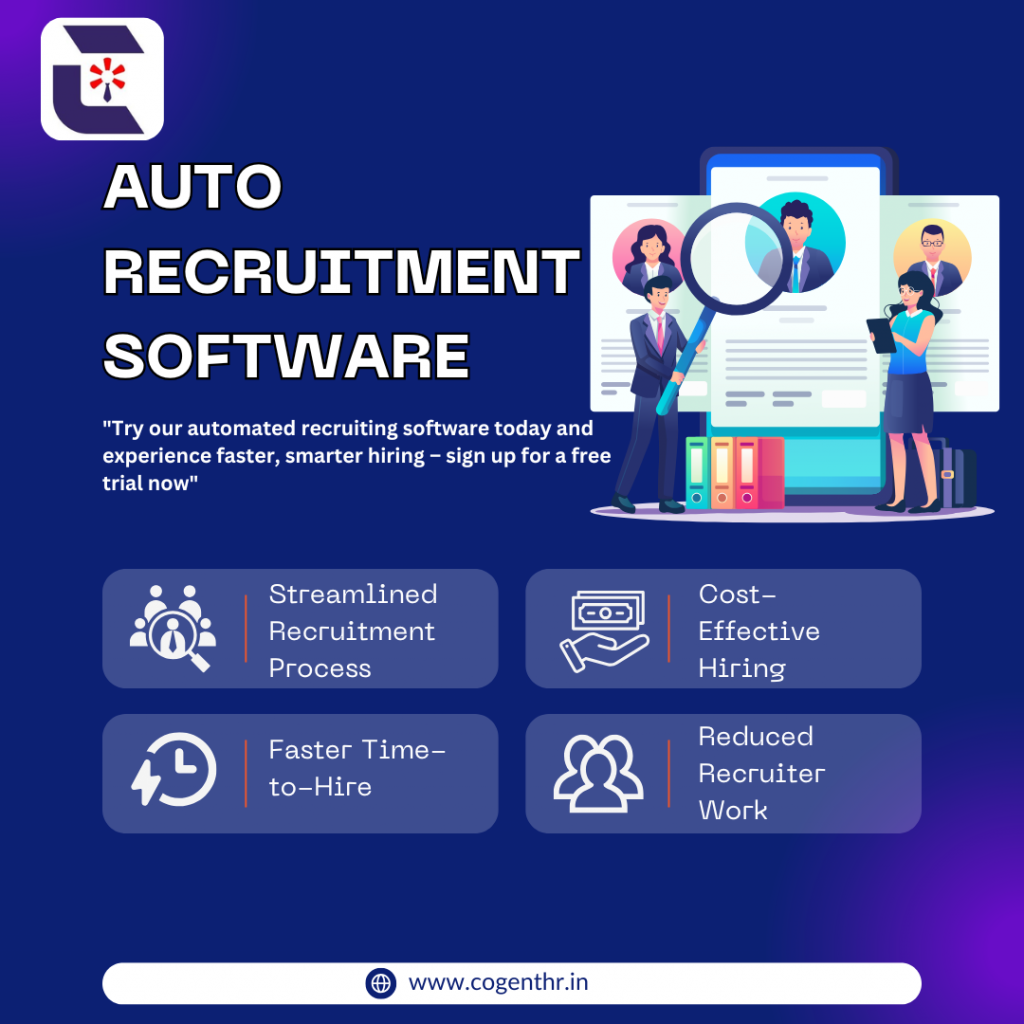In today’s rapidly evolving business world, recruitment is no longer just about filling open positions—it’s about finding the right talent that aligns with your company’s values and goals. As HR professionals, understanding the benefits of a well-structured recruitment process can significantly impact not only your hiring success but also your company’s overall growth and efficiency.
In this article, we’ll explore top facts every HR professional should know about the benefits recruitment brings to your organization. From enhancing candidate experience to improving diversity, this comprehensive guide will help you understand how effective recruitment strategies can transform your HR efforts and lead to long-term success.

1. The Growing Importance of Recruitment in HR
Recruitment has always been a crucial part of human resources, but its importance has grown substantially in recent years. As businesses expand and competition intensifies, the ability to attract and retain top talent is a key differentiator between successful organizations and those that struggle to keep up.
Fact 1: Recruitment is no longer just an administrative task but a strategic driver for business success. A well-executed recruitment strategy directly affects the company’s ability to compete in the market, maintain productivity, and innovate.
Supporting Data: According to a recent survey by LinkedIn, 83% of talent professionals and hiring managers say that finding the right candidates is their top challenge. When HR departments invest in improving their recruitment processes, they are positioning the company to succeed in an increasingly competitive job market.
Impact on HR: Recruitment is at the core of HR’s role in shaping company culture and ensuring growth. The right hiring decisions directly impact employee performance, job satisfaction, and retention, while poor recruitment can lead to high turnover and loss of valuable resources.
2. Enhanced Candidate Experience
In today’s competitive job market, candidates have choices, and their experience throughout the hiring process plays a significant role in whether they choose to accept an offer. A smooth and positive recruitment process not only attracts top talent but also strengthens your employer brand.
Fact 2: Recruitment is the first touchpoint between candidates and the organization. How candidates are treated during the hiring process can significantly impact their perception of your company.
Benefits: A positive candidate experience leads to better employer branding, as candidates who have a good experience—even if they are not hired—are more likely to recommend your company to others. In fact, 72% of candidates who have a positive experience are more likely to refer others to your company, and 69% are likely to apply again in the future.
Impact on HR: HR departments need to prioritize providing timely feedback, transparent communication, and a smooth application process to ensure that candidates view the company positively, regardless of the outcome. Recruitment tools like applicant tracking systems (ATS) can help streamline these processes and provide a more organized, efficient experience for both candidates and HR teams.
3. Cost Efficiency Through Automated Recruitment
Recruitment can be a time-consuming and expensive process, especially when done manually. However, automation tools have revolutionized the way HR teams handle recruiting, making the process more cost-effective, faster, and less prone to errors.
Fact 3: Automated recruitment tools can save HR departments valuable time and reduce costs by streamlining several steps in the hiring process, from resume screening to interview scheduling.
Explanation: Automated resume screening tools, for example, can quickly filter out unqualified candidates, allowing HR professionals to focus on the best-fit applicants. Similarly, interview scheduling automation removes the need for back-and-forth emails, enabling HR teams to focus on more strategic tasks. Automation can also reduce human error in candidate communication, ensuring that updates and reminders are sent on time.
Benefits: By automating repetitive tasks, HR professionals can reduce the time-to-hire and decrease the administrative burden on the HR team. This, in turn, lowers the overall cost-per-hire, which is critical for organizations with limited resources or those looking to scale their hiring efforts.
4. Better Talent Acquisition
One of the most significant benefits of an effective recruitment strategy is its ability to attract better talent. A streamlined, targeted approach helps HR departments find candidates who not only meet the technical requirements but also fit into the company’s culture.
Fact 4: Effective recruitment strategies lead to a higher quality of candidates and better talent acquisition outcomes.
Supporting Data: A study by the National Association of Colleges and Employers (NACE) found that 63% of companies with strong recruitment programs report better overall talent acquisition. Additionally, businesses that focus on quality talent acquisition tend to have higher employee retention rates.
Impact on HR: By implementing data-driven recruitment practices, such as leveraging ATS to source passive candidates or using skills assessments to evaluate applicants’ abilities, HR teams can ensure they are hiring the best candidates for their needs. This leads to better performance, innovation, and long-term success for the company.
5. Reducing Employee Turnover
Recruiting the right candidates is critical not only for filling positions but also for reducing employee turnover. The cost of turnover is significant, involving recruitment expenses, training costs, and the loss of organizational knowledge.
Fact 5: Recruitment processes that prioritize cultural fit and alignment with company values significantly reduce employee turnover.
Benefits: When candidates are hired for roles that align with their skills and interests, and they feel connected to the company’s culture, they are more likely to stay longer. HR departments that invest time in building a thorough recruitment process that evaluates cultural fit and long-term potential can expect lower turnover rates.
Impact on HR: High turnover disrupts HR operations and leads to added expenses in terms of recruitment and training. Reducing turnover not only saves money but also contributes to a more stable, productive workforce.
6. Improving Diversity and Inclusion
A diverse workforce brings a range of perspectives that drive creativity, problem-solving, and innovation. Effective recruitment strategies are essential for ensuring that HR departments are building a diverse and inclusive workforce.
Fact 6: Recruitment plays a pivotal role in promoting diversity within an organization. By using inclusive hiring practices, HR can increase the representation of different demographic groups in the workplace.
Benefits: Diverse teams are shown to outperform homogeneous teams. According to McKinsey, companies with more diverse workforces perform better financially. Recruitment strategies that focus on diversity and inclusion lead to higher employee satisfaction, better decision-making, and a more innovative company culture.
Impact on HR: HR departments should focus on building recruitment processes that remove bias and ensure a fair assessment of candidates. This can involve blind recruitment methods, diverse hiring panels, and targeting underrepresented communities to ensure a diverse applicant pool.
7. Recruitment Metrics for HR Success
Measuring recruitment effectiveness is critical for continuously improving the hiring process. Recruitment metrics provide valuable insights into the efficiency of your processes and where improvements can be made.
Fact 7: Recruitment metrics like time-to-fill, cost-per-hire, and quality-of-hire are essential for measuring the success of recruitment efforts.
Explanation: Time-to-fill measures how long it takes to hire a candidate from the moment a job is posted, while cost-per-hire tracks the expenses associated with each hire. Quality-of-hire assesses the performance and retention of new hires over time. Tracking these metrics helps HR teams identify bottlenecks and areas for optimization.
Benefits: By analyzing these key metrics, HR professionals can make data-driven decisions to improve recruitment strategies and ensure that hiring processes are both efficient and effective.
8. The Future of Recruitment in HR
As technology continues to evolve, so too does the field of recruitment. HR professionals need to stay ahead of emerging trends and incorporate new tools to remain competitive.
Fact 8: The future of recruitment lies in leveraging advanced technologies like artificial intelligence (AI), machine learning, and predictive analytics.
Technological Advancements: AI and machine learning are already being used to automate resume screening, match candidates with job roles, and predict candidate success. Predictive analytics can also help HR departments make data-driven hiring decisions by forecasting candidate success and retention.
Impact on HR: HR professionals who embrace these new technologies can stay competitive, streamline their recruitment processes, and ensure they are attracting the best talent.

How Cogent HR Helps HR Professionals in Recruitment
In an increasingly competitive job market, HR professionals need to leverage the best tools available to streamline their recruitment processes. Cogent HR offers a suite of automated solutions designed to help HR teams save time, reduce costs, and improve the quality of hires. Here’s how Cogent HR can transform your recruitment efforts:
Automated Resume Screening
With Cogent HR, HR professionals no longer need to sift through hundreds of resumes manually. Our resume screening tool automates the process by matching resumes to job descriptions, ensuring that only the most qualified candidates make it to the next stage.
Candidate Assessments
We understand that hiring the right candidate requires more than just a resume. Cogent HR allows companies to set customized assessments for job applicants. This ensures that candidates not only meet the technical requirements but also align with your company’s skill standards, resulting in better hires.
Interview Scheduling Automation
Gone are the days of endless back-and-forth emails to schedule interviews. Cogent HR automates interview scheduling, allowing HR professionals to book interviews efficiently, without the headache of coordinating with multiple candidates and hiring managers.
Automated Communication
Effective communication is key to a positive candidate experience. Cogent HR automates candidate communications, including interview status updates, feedback requests, and reminders. This ensures that candidates are always kept in the loop, improving the overall candidate experience and reducing the risk of missed opportunities.
Data-Driven Recruitment
Cogent HR provides insights into recruitment performance through data-driven analytics. From tracking time-to-hire to monitoring the effectiveness of job postings, HR professionals can make informed decisions to optimize the recruitment process continuously.
Diversity and Inclusion Initiatives
Promoting diversity is not just about meeting quotas—it’s about fostering an inclusive workplace. Cogent HR enables HR teams to implement diverse hiring practices by providing tools to assess and mitigate bias throughout the recruitment process.
KNOW MORE: How Cogent HR Simplifies Recruitment for Small Businesses – 2025
Conclusion
The recruitment process is more than just a necessary task—it’s a strategic driver that impacts all areas of HR. By understanding and leveraging the benefits of effective recruitment, HR professionals can make smarter, more data-driven decisions that lead to better hires, improved employee retention, and overall organizational success.
Cogent HR provides a comprehensive, automated solution that simplifies and accelerates the recruitment process. From automated resume screening to interview scheduling and data-driven insights, Cogent HR enables HR professionals to focus on what matters most—finding the right talent.
To stay ahead in today’s competitive job market, HR departments must embrace modern recruitment practices, incorporate automation tools, and focus on building a diverse, inclusive, and engaged workforce. Cogent HR is here to support you every step of the way.